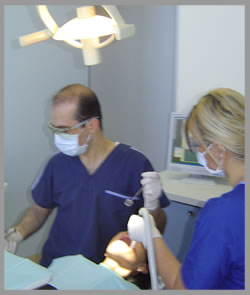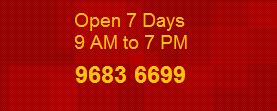Temporomandibular disorder
(TMJ, TMJD or TMD)
Temporomandibular disorder (TMJ, TMJD or TMD)
affects the temporomandibular joint, an area that includes
the hinge jaw joint (the bridge for the lower jaw or mandible)
and the temporal bone of the skull located in front of each
ear, the muscles surrounding the jaw and the jaw itself.
 This
area of the face contributes to chewing, bite (occlusion)
and jaw movement. Therefore, TMJ disorder compromises jaw
flexibility and may cause pain at rest or during common movements
such as talking, chewing and yawning. This
area of the face contributes to chewing, bite (occlusion)
and jaw movement. Therefore, TMJ disorder compromises jaw
flexibility and may cause pain at rest or during common movements
such as talking, chewing and yawning.
The pain and discomfort caused by TMJ disorder
may be severe, can be either intermittent or constant and
may last for many years.
Causes of TMJ Disorder
TMJ disorder has often been portrayed as psycho-stress related,
but in truth there are many different types of TMJ, any one
of which may result from multiple causes.
The most common factor contributing to TMJ
is a bite problem affecting the joint itself. Interferences
in the structure of individual teeth may force displacement
of the lower jaw, leading the muscles to position the joints
out of their sockets to force the upper and lower teeth to
fit together. Anatomical factors within the joint or surrounding
muscles (such as the presence of scar tissue) may also interfere
with the bite and cause TMJ disorder.
In other cases, TMJ may result from a jolting injury to the
head or face. Also, wear and tear on the teeth due to aging
or tooth grinding and clenching may cause uneven surfaces
on the teeth, leading to interferences in the bite and improper
jaw closure.
TMJ Symptoms and Diagnosis
The onset of TMJ symptoms is typically the first step toward
diagnosis. Pain is TMJ disorder’s most common symptom. People
with TMJ may experience severe pain and discomfort in the
face, jaw joint, neck and shoulders. During a dental consultation
to evaluate TMJ, your dentist will evaluate pain with a “clench
test.” If any one tooth, all teeth, or the jaw are in pain
when you bite down during a clench test, your pain is probably
related to a bad bite.
TMJ sufferers often experience jaw clicking, popping or locking
during movement. In some cases, chewing is difficult, or the
bite may not align properly (malocclusion). You may also experience
swelling on the side of the face, toothaches, headaches, neck
aches, earaches and hearing problems.
A dentist suspecting TMJ disorder will first evaluate your
bite (occlusion). To study your jaw-to-bite relationship as
well as the position and condition of the temporomandibular
joint, your dentist will make mold impressions of your bite
and mount them on an instrument called an articulator, a device
that mimics the jaw's movement and joint closure. During this
study, your dentist will determine if a structural disorder
exists within the joint itself or if deflective interferences
in the bite such as uneven teeth are affecting the joint's
ability to close properly, thus causing the TMJ.
Temporary TMJ Symptom Relief
Many self-help remedies have been suggested to treat TMJ
symptoms, but be aware that these remedies do not treat the
cause. In fact, TMJ treatment through the right dentist may
be less costly, less time intensive and can produce a fully
satisfactory result.
Although the following self-help remedies do not treat TMJ
long-term, temporary relief may be found:
Heat and Cold Packs: Heat and cold packs
applied to the side of the face and temple for 10 minute intervals
may reduce the intensity of the pain affecting the muscles
and surrounding area of the jaw.
Limit Jaw Movement: It is important to avoid
large movement of the jaw such as singing and wide yawning.
Also, do not apply pressure with your hand against your jaw
for an extended time period during sleep. Limit the pressure
you apply with a phone receiver.
Diet: Choose soft food and stay away from
foods requiring repetitive chewing or the mouth to open wide.
In particular, avoid chewing gum, taffy, pretzels and raw
carrots.
Dental Treatment: Continue to receive dental
treatment for any teeth requiring restoration. Tooth decay
may affect the bite, a contributing factor to TMJ.
Physical Therapy, Biofeedback, and Massage:
In some cases, physical therapy, biofeedback and massage provide
temporary relief from TMJ.
Medications: Some doctors or dentists may
prescribe non-steroidal anti-inflammatory drugs (NSAIDs like
ibuprofen), muscle relaxants, anti-anxiety medications and
in some cases anti-depressants. The choice of medication depends
on the intensity of the disorder and your medical history.
However, the need for medication is greatly reduced when treatment
is received by an experienced TMJ dental professional.
Dental Appliances: Your dentist may prescribe
a dental appliance such as a mouth guard or splint to reduce
the effects of tooth grinding and clenching. Such appliances
may also help improve your bite and the ability for the lower
jaw to fall properly into the temporomandibular joint socket.
|





